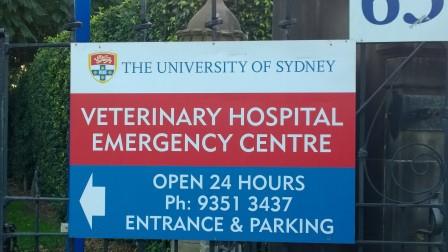University of Sydney vet studies link between pet abuse and domestic violence
Sydney Faculty of Veterinary Science Pathology Resident Dr Lydia Tong has shown vets how to tell the difference between bone fractures caused by accidents and those caused by abuse.
Pet abuse and domestic violence are closely linked. Dr Tong’s fracture identification methods are giving vets the added confidence to identify cases of violence against pets and could serve as a warning of domestic violence.

Now, in a new study with Domestic Violence NSW, Dr Tong, from the Sydney Faculty of Veterinary Science, is looking deeper into the connections between animal abuse and domestic violence to assess the need for better services to protect both human and animal victims.
“Around seventy percent of women escaping violent homes also report pet abuse,” Dr Tong said. “So vets are often the first to see evidence of abuse in a family, when they treat injured pets.”
“Different forces on bones can tell a story—the skeleton of an animal keeps a distinct record that indicates the force applied to bones from past injuries, breaks or fractures. But it can often be difficult for vets to say with confidence whether a fracture has resulted from abuse or accident.”
To give vets this confidence, in a 2014 study, Dr Tong collected cases of abused dogs that were punched, hit with a blunt weapon or kicked, and examined the fractures from these injuries. She then compared these fractures to those caused by genuine accidents. Her results, published in The Veterinary Journal, identified five key features of fractures that vets could look for to distinguish accidents from abuse.
Now, having given vets this reference to diagnose abuse, the Sydney Veterinary School pathology resident and her colleagues are gathering more information on the connections between domestic violence and animal abuse.
“We already know that many women will delay seeking shelter if their pets are threatened or can’t be housed along with them,” explains Dr Tong.
“US studies also tell us that domestic violence perpetrators who also abuse pets are more dangerous—they have increased rates of physical and sexual violence and stalking, and are more likely to kill their partners.
“We need to know more about the relationship between animal and human abuse in Australia so that we can recognise abuse earlier, save lives, and provide appropriate services for victims and for their pets.”
The study will survey victims of domestic violence who are also pet owners.
“Perpetrators of violence will often threaten to abuse or harm family pets as a way to exert control,” said Moo Baulch, CEO of Domestic Violence NSW.
“This research is essential because we need to have a much clearer picture of the connections between domestic and family violence and the abuse of animals.
Building a solid evidence base in this area will assist policymakers, domestic and family violence services and people working with animals to better respond to the needs of women and children with pets who are experiencing violence and are afraid to leave.”
Dr Tong and her team are keen to hear from other domestic violence support agencies, services or refuges that would be willing to be involved with this study.
Sydney Veterinary School Doctor of Veterinary Medicine
The Sydney DVM is an exciting new graduate entry veterinary program, commencing in 2015. The DVM replaces the university’s existing Bachelor of Veterinary Science, and is open to applicants with a completed bachelor’s degree who wish to study veterinary medicine in a postgraduate learning environment. This program is internationally recognised and accredited so graduates can work around the world.
Program title: Doctor of Veterinary Medicine (DVM)
Location: Sydney, New South Wales
Semester intake: March 2015
Program duration: 4 years
Application deadline: October 31, 2014
Admissions Criteria/Entry Requirements for Canadians
Students can apply for a position into the Sydney DVM after completing any kind of bachelor’s degree at a recognized university, as long as program prerequisite units of study have been met.
Applicants must have completed the following prerequisite units of study at bachelor’s degree level to be eligible for entry:
- general chemistry (physical and inorganic)
- organic chemistry
- biology
- biochemistry
The minimum GPA for entry is a 2.8 on a 4.0 scale; however, places are limited and there is a strict quota for this course. Entry is highly competitive so students who have achieved the minimum GPA (and other admission requirements) are then ranked on academic performance. The higher your GPA, the better your chances of receiving an offer.
Apply to the Sydney Veterinary School!
*

































Ask A Question
Ask us about your program of interest, or if you have a question about our services.
CONTACT US TODAY